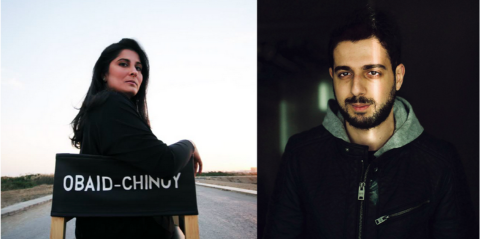
Journalists from Pakistan and Syria whose work exposed extremism and inhumanity in their countries are winners of the 2017 Knight International Journalism Award, the International Center for Journalists (ICFJ) announced. The award recognizes stellar reporting that has made a major impact.
The recipients are Sharmeen Obaid-Chinoy, a Karachi-based journalist and filmmaker whose reports led to legislative changes in Pakistan, and Karam al-Masri, a Syrian photojournalist and videographer who persisted in covering the siege of Aleppo through a near-total blackout of news from the city.
“At great personal risk, Obaid-Chinoy and al-Masri faced terrorism head on, getting behind the scenes to chronicle untold abuses,” said ICFJ President Joyce Barnathan.
The award is supported by John S. and James L. Knight Foundation, which funds ICFJ's Knight International Journalism Fellowships. The fellowships promote a global culture of news innovation.
“These reporters exemplify journalism excellence, telling stories that advance change and revealing truths that would not be uncovered, but for their efforts,” said Jennifer Preston, Knight Foundation vice president for journalism.
Obaid-Chinoy’s documentaries, which have won two Oscars, tackle abuse of women and children. Her “Frontline” documentary, “Children of the Taliban,” told of Pakistani boys who were groomed in Taliban schools to carry out attacks against civilians. “Saving Face” focused on acid attacks on women. The film prompted Pakistan's most populous province to process these cases through anti-terrorism courts to ensure speedier justice.
"A Girl in the River" explored an attempted “honor killing” of a young woman who married someone her family did not choose. The film drew attention to a loophole which allowed these murders to go unpunished. Pakistan’s Parliament then passed a law criminalizing honor killings.
Karam al-Masri captured heartbreaking images of his country despite tremendous hardship and abuse. When the Syrian war began in 2011, al-Masri was a law student in Aleppo. He began taking photos on his phone of anti-regime demonstrations. Soon, he bought a professional camera to better capture the conflict.
In 2013, he became a freelance photographer for the AFP. His ethics, news judgment and commitment quickly turned him from a talented citizen journalist into a trusted professional. His images of wounded or orphaned children prompted outrage and offers of financial assistance from around the world.
He continued to take photos even after his mother was killed in a bomb attack and he was held for six months by ISIS. As the conflict grew worse, he became one of the only sources of news from Aleppo.
The winners will be honored on November 9 at ICFJ’s Awards Dinner in Washington, DC.
To meet the urgent need for reliable information, ICFJ promotes a professional journalism whose primary goal is to seek the truth. We help journalists use best practices and new technologies to improve the quality of news media. We believe that better journalism leads to better lives. For more information, visit www.icfj.org.
Knight Foundation is a national foundation with strong local roots. We invest in journalism, in the arts, and in the success of cities where brothers John S. and James L. Knight once published newspapers. Our goal is to foster informed and engaged communities, which we believe are essential for a healthy democracy. For more information, visit www.knightfoundation.org.